
Malamine Camara (died in 1886) was a Senegalese sergeant in the French colonial army, and a key figure in the extension of French colonial rule in the Congo Basin.

Malamine Camara (died in 1886) was a Senegalese sergeant in the French colonial army, and a key figure in the extension of French colonial rule in the Congo Basin.
Camara was born in the Senegalese interior, though his exact date and place of birth are not known. His ethnicity has been described as Soninke, [1] but a French contemporary described Camara as having "a mix of Moor and Berber blood" and notes that he spoke the Toucouleur language. [2] Camara was recruited as a laptot or colonial soldier, probably in the early 1870s. In Dakar, January 1880, he volunteered to join an expedition led by Franco-Italian explorer Pierre Savorgnan de Brazza from the coast of Gabon to the Congo River. The mission included 11 other West African soldiers, 4 Gabonese interpreters, and 4 Frenchmen including Brazza. Camara quickly proved his worth on the expedition, learning local languages and winning the support of local populations, as well as the respect of his French commanders.
In October 1880, Brazza assigned Camara to lead a 3-man detachment tasked with founding an outpost in Mfoa, which is the site of present-day Brazzaville on the right bank of the Congo River. Camara and his men stayed there for more than 18 months until they received orders to return to Gabon. During this period at Mfoa, in which Camara received neither reinforcements nor significant supplies from the French, he established excellent relations with local communities. Through his hunting skills, he not only kept his men fed but even made regular contributions of meat (hippopotamus and buffalo) to chiefs in the area, who nicknamed him mayele (meaning a resourceful person) and tata nyama, meaning "meat father." Camara carried out his mission to show the French flag and defend France's newly acquired territory from rival claims by Belgium. [3]
Camara twice encountered Henry Morton Stanley, the American explorer who was leading Belgian efforts to claim and colonize the Congo region. They first met in July 1881, when Camara and his two men went to visit Stanley's camp at Kinshasa on the left bank of the river. To dissuade the American from trying to expand Belgian territorial claims across the river, Camara showed him a copy of the treaty a local king, Makoko Iloo I, had signed with Brazza granting his territory to France. The two men met again in January 1882, when Stanley sailed across the river in a newly arrived steamboat accompanied by a large number of Zanzibari mercenaries. French historians have speculated that Stanley hoped this show of force would cause Camara and his men to abandon their post at Mfoa, thus letting Belgium usurp France's claim to the territory. In any case, Camara's squad held its ground, and Stanley and his men promptly returned to their camp across the river. Stanley wrote in his memoirs that he was impressed by the Senegalese sergeant, who appeared very devoted to his mission and very much in charge of his men. [4]
In May 1882, a messenger brought a written order from the French military command that Camara and his men were to leave Mfoa and return to the French post in Franceville, Gabon. Camara was dubious of this order, and suspected that Belgium had pressured the French to withdraw. Prior to leaving, Camara visited all the local chiefs and told them that his absence would be only temporary, and urged them to remain loyal to France while he was away. [5]
Brazza, who had since returned to France, mounted another expedition to the Congo basin in 1883, and put Camara in charge of recruiting the mission's African personnel in Dakar. Once on the Gabonese coast, Camara was responsible for purchasing dugout canoes with which the expedition would travel into the interior. When they reached the Congo River, they found local populations overjoyed at Camara's return; his personal efforts may have prevented these populations from succumbing to Stanley's influence. Throughout this mission Camara was indispensable to his commanders, supplying ample meat from his hunts and maintaining the trust of the local people. His importance to the French mission was so great that, as Brazza's deputy Charles de Chavannes later claimed, the Belgians in Kinshasa put a bounty on his head. [6] Before departing for the coast in 1884, Brazza left Chavannes in charge of the new permanent Brazzaville outpost; Malamine served as Chavannes' aide-de-camp and was instrumental in provisioning the post with food.
On February 1, 1885, during a ceremony in Brazzaville, Camara was awarded the Médaille militaire , among France's highest honors given to non-citizens in its armed forces. [7] But his health was ailing from what appears to have been a bladder infection. By early 1885 the camp physician believed that Camara was dying, and the sergeant went home to Senegal later that year. He died in January 1886 in the military hospital in Goree Island. The precise cause of his death is unknown.
While Camara's singular contributions to the establishment of France's Congo colony were generally unappreciated during his lifetime (indeed, he was never even able to collect the pay from his last mission), in the years following his death the French dedicated a bronze plaque in Brazzaville and christened a steamboat in his honor. A side street in the Poto-Poto neighborhood of Brazzaville was also named after him. In his native Senegal, a secondary school was renamed in his honor. During an official visit to Brazzaville in April 2018, Senegalese President Macky Sall paid tribute to Camara and his role in Congo's colonial history. [8]
The history of the Republic of the Congo has been marked by diverse civilisations: Indigenous, French and post-independence.

Brazzaville is the capital and largest city of the Republic of the Congo. Administratively, it is a department and a commune. Constituting the financial and administrative centre of the country, it is located on the north side of the Congo River, opposite Kinshasa, the capital city of the Democratic Republic of the Congo.

Pierre Paul François Camille Savorgnan de Brazza was an Italian-French explorer. With his family's financial help, he explored the Ogooué region of Central Africa, and later with the backing of the Société de Géographie de Paris, he reached far into the interior along the right bank of the Congo River. He has often been depicted as a man of friendly manner, great charm and peaceful approach towards the Africans he met and worked with on his journeys, but recent research has revealed that he in fact alternated this kind of approach with more calculated deceit and at times relentless armed violence towards local populations. Under French colonial rule, the capital of the Republic of the Congo was named Brazzaville after him and the name was retained by the post-colonial rulers, one of the few African nations to do so.

The French Congo, also known as Middle Congo, was a French colony which at one time comprised the present-day area of the Republic of the Congo and parts of Gabon, and the Central African Republic. In 1910, it was made part of the larger French Equatorial Africa.

Émile Gentil was a French colonial administrator, naval officer, and military leader. He is best known for heading two military missions to conquer and consolidate territories north from modern Gabon to Chad.
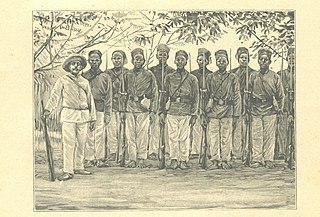
Laptots were African colonial troops in the service of France between 1750 and the early 1900s.
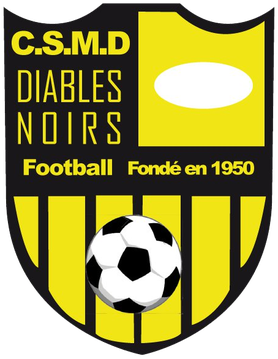
Club Sportif Multidisciplinaire Diables Noirs or simply CSMD Diables Noirs is a Congolese football club based in Brazzaville.
Jean-Dominique Okemba is a Congolese military and political figure. He has been a special adviser to the President of Congo-Brazzaville, Denis Sassou Nguesso, since 1997, and he has also been the secretary-general of the National Security Council since 2002. He is a nephew of Sassou Nguesso.

Franco–Congolese relations are the current and historical relationship between the French Republic and the Republic of the Congo. France maintains an embassy in Brazzaville and a consulate in Pointe Noire. France controlled the Republic of the Congo as a colony from the 1880s until the Congo's independence in 1960. Following the collapse of communism worldwide, France has become Congo's most significant external trading partner.

The International African Association was a front organization established by the guests at the Brussels Geographic Conference of 1876, an event hosted by King Leopold II of Belgium. The Association was used by King Leopold ostensibly to further his purportedly altruistic and humanitarian projects in the area of Central Africa, the area that was to become Leopold's privately controlled Congo Free State. King Leopold volunteered space in Brussels for the International African Association's headquarters, and there were to be national committees of the association set up in all the participating countries, as well as an international committee. Leopold was elected by acclamation as the international committee's first chairman, but said that he would serve for one year only so that the chairmanship could rotate among people from different countries.

Dr. Noël Eugène Ballay was a French auxiliary doctor of the French navy, and a poet. He was an explorer and colonial administrator, the second Governor-General of French West Africa.

Prosper Philippe Augouard , C.S.Sp. was a French Catholic priest, missionary, and explorer of Africa.
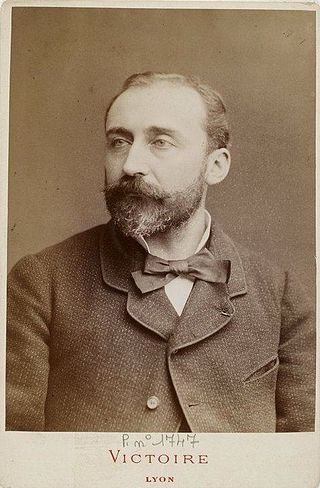
Fortuné Charles de Chavannes, born 19 May 1853 in Lyon and died 7 February 1940 in Antibes, was a French colonial administrator. He accompanied Pierre Savorgnan de Brazza on the Mission de l'Ouest africain from 1883 to 1886, and participated in the exploration and establishment of French Congo.
The following is a timeline of the history of the city of Brazzaville, Republic of the Congo.
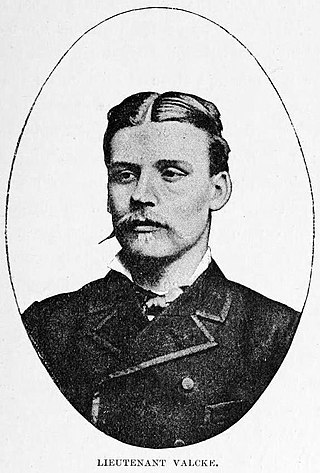
Louis Pierre Alphonse Valcke was a Belgian viceroy and soldier.

Edmond-Winnie-Victor Hanssens was a Belgian soldier and colonial administrator. He did much to establish the Belgian presence on the Upper Congo River in the last two years of his life.
Anthony Bannister Swinburne was a British explorer and ivory trader who served as an assistant to Henry Morton Stanley. He is known for developing the Léopoldville station, later to become the city of Kinshasa.

General Charles-Marie de Braconnier, or Carlos Braconnier was a Belgian soldier who participated in the expeditions led by Henry Morton Stanley and was the founder and first commander of the station of Léopoldville.
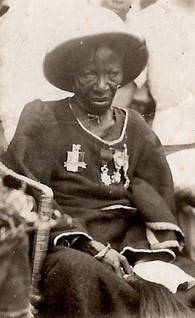
Ngalifourou was a queen of the Mbé region in what is today the Republic of Congo (Congo-Brazzaville). As a ruler she was close to French colonial authorities and was the first ruler in her region to sign a treaty with them.

Gabonese nationality law is regulated by the Constitution of Gabon, as amended; the Gabonese Nationality Code, and its revisions; and various international agreements to which the country is a signatory. These laws determine who is, or is eligible to be, a national of Gabon. The legal means to acquire nationality, formal legal membership in a nation, differ from the domestic relationship of rights and obligations between a national and the nation, known as citizenship. Nationality describes the relationship of an individual to the state under international law, whereas citizenship is the domestic relationship of an individual within the nation. Gabonese nationality is typically obtained under the principle of jus soli, i.e. by birth in Gabon, or of jus sanguinis, born to parents with Gabonese nationality. It can be granted to persons with an affiliation to the country, or to a permanent resident who has lived in the country for a given period of time through naturalization.